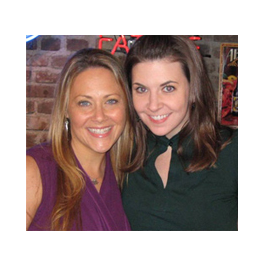Kristin Elmore feels honored to have spent last year as roommate and caregiver to her true, blue best friend, Jennie, who died of a glioblastoma multiforme in May 2011. If wishes came true and money grew on trees, Kristin would find a way to make a living writing about Jennie, her experiences as a caregiver and helping to carry forward the enduring gift Jennie left behind.
The jetlag from international travel gives me the strangest dreams. On my first night home after a particularly taxing business trip, I woke in a sweaty panic.
Jennie and I were sitting in an MD Anderson exam room and she crumbled in my lap. I couldn’t wake her, I couldn’t hold her, I couldn’t save her. It was one of those dreams that stays with you for days, the kind that makes your heart hurt when you think about it.
I sat on the edge of her bed the next day and told her about my dream. She — the one who was living it, the one who was dying — only wanted to comfort me. “We shouldn’t have to deal with this at 30. It’s OK to be scared,” she said.
Jennie was diagnosed with a stage IV glioblastoma in February 2009. Numbness down the left side of her body and a telling metallic taste in her mouth took her to her general practitioner in January of that year. He suspected migraines, but did an MRI just to be safe.
She hadn’t even made it all the way home from her appointment before he called to ask that she return to his office. When she arrived, he handed her a disk containing her scans and a card for the Brain and Spine Center at MD Anderson. “Good luck,” he said.
One awake craniotomy, six weeks of radiation and 14 months of chemo led Jennie to May 5, 2010, when she got the “all clear” from her doctors. She was tumor free. Her hope and positive thinking almost silenced my realism. Almost.
The tumor was back
The morning of September 17, 2010, Jennie stood in my room in the dark, asking for help getting dressed. I flipped on the lamp confused to find her leaning heavily to one side. “What’s wrong, Jen?”
She couldn’t feel her arm; she couldn’t make sense of what I was saying.
We had one last summer; four months of fun without worrying about cancer and now the tumor was back at nearly four times its original size.
That night, I watched her sleep in her hospital room, unable to comprehend how she could look so peaceful when something so caustic was pushing its way through her cells. “Can I crawl in bed with you?”
The day doctors told Jennie they had exhausted every attempt to save her, she didn’t break down, instead she calmly asked for information about organ donation. What upset her most was learning that she was not a candidate.
The chemotherapy and radiation treatments had rendered her organs useless. “Fine, then I’ll donate my brain.”
In the early morning hours of May 29, 2011, Jennie left us here. We sat around her, speaking quietly as if she was asleep. We each leaned down to kiss her forehead and whisper our last sentiments. “Please don’t go.”
An hour later, in one of the most professional displays of respect I have seen, a team from MD Anderson helped Jennie carry out her final wish. Hers was the most selfless and enduring gift, a gift for knowledge, a gift that took her life.
That gift continues to grow in a Houston lab nearly a year later, answering questions that could save another’s life or maybe prevent the same suffering Jennie endured.
Running in memory
Next Sunday, Team Jennie will run in memory, love and support at the 10th Annual Run for the Rose. All proceeds from the event will fuel brain cancer research to help find the answers that can lead to longer survival and less pain.
Last year, the race took place just six weeks before her death, but Jennie sat smiling at the finish line, confined to a wheelchair and cheering loudly for those who came out to support her. This year, we’ll run without her, each of us looking to be reinvigorated with the hope that only a crowd of 4,000 people who share your pain can impart.
In my life, I have found true love and true friendship in Jennie. She gave everything, she took nothing. And as much as she needed me in the end, she will never know how much I need her now.
We are all left unable to wake her, unable to hold her, unable to save her; only to love her and thank her for all she has left behind.

